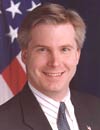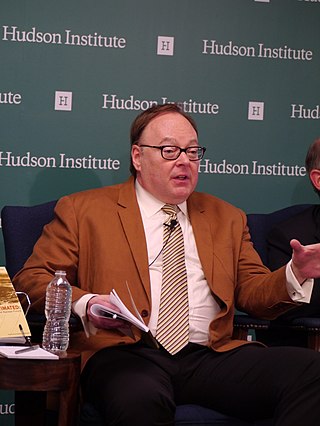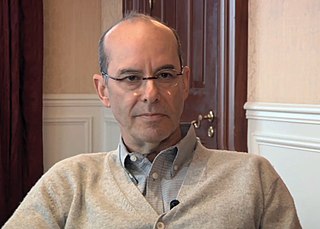Related Research Articles

The Hoover Institution is an American public policy think tank and research institution that promotes personal and economic liberty, free enterprise, and limited government. While the institution is formally a unit of Stanford University, it maintains an independent board of overseers and relies on its own income and donations. It is widely described as a conservative institution, although its directors have contested the idea that it is partisan.

The Princeton School of Public and International Affairs is a professional public policy school at Princeton University. The school provides an array of comprehensive coursework in the fields of international development, foreign policy, science and technology, and economics and finance through its undergraduate (AB) degrees, graduate Master of Public Affairs (MPA), Master of Public Policy (MPP), and PhD degrees. The school is consistently ranked as one of the best institutions for the study of international relations and public affairs in the country and in the world. Foreign Policy ranks the Princeton School as No. 2 in the world for International Relations at the undergraduate and No. 4 at the graduate level, behind the Edmund A. Walsh School of Foreign Service at Georgetown University.
Williamson M. "Bill" Evers is an American libertarian activist and education researcher. In 1988, he became a resident scholar at Stanford University's Hoover Institution first as a national fellow, then as a visiting scholar, and most recently as a research fellow there and at The Independent Institute. He went on leave from Hoover to serve as Assistant Secretary for the Office of Planning, Evaluation and Policy Development in the United States Department of Education in 2007 to 2009. At the beginning of September 2016, he was selected to lead the "agency action team" for the Department of Education in the Trump-Pence transition.

Sidney David Drell was an American theoretical physicist and arms control expert.
Peter Berkowitz is an American political scientist, former law professor, and United States Department of State employee, most recently serving as the Director of Policy Planning at the United States Department of State. He currently serves as the Tad and Dianne Taube Senior Fellow at the Hoover Institution of Stanford University.
David Jonathan Andrew Held was a British political scientist who specialised in political theory and international relations. He held a joint appointment as Professor of Politics and International Relations, and was Master of University College, at Durham University until his death. He was also a visiting Professor of Political Science at Libera Università Internazionale degli Studi Sociali Guido Carli. Previously he was the Graham Wallas chair of Political Science and the co-director of the Centre for the Study of Global Governance at the London School of Economics.
Harry Harding is an American political scientist specializing in Chinese politics and foreign affairs. He was the founding dean of the Batten School of Leadership and Public Policy at the University of Virginia, and had previously served as dean of the Elliott School of International Affairs at George Washington University. Harding has advised several US Presidents on developments in the PRC; before the Tiananmen Square demonstrations he was brought to Camp David for informal discussions with the first Bush administration. He has written several books, including China's Second Revolution and A Fragile Relationship: The United States and China Since 1972. Harding has a Chinese name: 何汉理.
In politics, gridlock or deadlock or political stalemate is a situation when there is difficulty passing laws that satisfy the needs of the people. A government is gridlocked when the ratio between bills passed and the agenda of the legislature decreases. Gridlock can occur when two legislative houses, or the executive branch and the legislature are controlled by different political parties, or otherwise cannot agree.

Edward Paul Lazear was an American economist, the Morris Arnold and Nona Jean Cox Senior Fellow at the Hoover Institution at Stanford University and the Davies Family Professor of Economics at Stanford Graduate School of Business.

Morton Charles Hill was an American diplomat and academic. He served as diplomat-in-residence and lecturer in international studies at Yale University. A career foreign service officer, Hill was a senior adviser to George Shultz, Henry Kissinger, and Ronald Reagan, as well as Boutros Boutros-Ghali, the sixth secretary-general of the United Nations.
Caroline Minter Hoxby is an American economist whose research focuses on issues in education and public economics. She is currently the Scott and Donya Bommer Professor in Economics at Stanford University and program director of the Economics of Education Program for the National Bureau of Economic Research. Hoxby is a John and Lydia Pearce Mitchell University Fellow in Undergraduate Education. She is also a senior fellow at the Hoover Institution and the Stanford Institute for Economic Policy Research.
The Roosevelt Institute's Network, formerly the "Roosevelt Institute Campus Network" and the "Roosevelt Institution", bills itself as the first student-run policy organization in the United States. It is a part of the Roosevelt Institute, an organization focused on carrying forward the legacy of Franklin Delano Roosevelt and Eleanor Roosevelt.

Charles Paul "Chuck" Blahous III is the J. Fish and Lillian F. Smith Chair and Senior Research Strategist at the Mercatus Center at George Mason University, as well as a visiting fellow at Stanford University's Hoover Institution, specializing in domestic economic policy and retirement security, as well as federal fiscal policy, entitlements, and health care programs.

George Pratt Shultz was an American economist, businessman, diplomat and statesman. He served in various positions under two different Republican presidents and is one of the only two persons to have held four different Cabinet-level posts, the other being Elliot Richardson. Shultz played a major role in shaping the foreign policy of the Ronald Reagan administration. From 1974 to 1982, he was an executive of the Bechtel Group, an engineering and services company.

Tod Lindberg is an American political expert and a current Senior Fellow at the Hudson Institute, having previously been at Stanford University's Hoover Institution. His research focuses on political theory, international relations, national security policy, and American politics. He was also the editor of Policy Review, the Hoover Institution's bimonthly journal. He is a member of the Council on Foreign Relations.

The Bush School of Government and Public Service is an undergraduate and graduate college of Texas A&M University founded in 1997 under former US President George H. W. Bush's philosophy that "public service is a noble calling." Since then, the Bush School has continued to reflect that notion in curriculum, research, and student experience and has become a leading international affairs, political science, and public affairs institution.
David G. Victor is a professor of innovation and public policy at the School of Global Policy and Strategy at UC San Diego where he holds the Center for Global Transformation Endowed Chair in Innovation and Public Policy. Victor is currently the co-director of the campus-wide Deep Decarbonization Initiative. D2I is a collaboration of faculty from across the UC San Diego campus who work at the intersection of science, technology and policy. The initiative was founded as a joint partnership between UC San Diego’s Jacobs School of Engineering and School of Global Policy and Strategy. At UC San Diego, Victor was previously the co-founder of the Laboratory on International Law and Regulation(ILAR)

Lanhee Joseph Chen is an American policy advisor, attorney, and academic. Chen serves as the David and Diane Steffy Fellow in American Public Policy Studies at the Hoover Institution, director of domestic policy studies and lecturer in the public policy program at Stanford University, and lecturer in law at Stanford Law School.

Kiron Kanina Skinner is a former Director of Policy Planning at the United States Department of State in the Trump administration. Prior to that, she was the Taube Professor of International Relations and Politics at Carnegie Mellon University, and the founding director of the Institute for Politics and Strategy and associated centers at the university. She is also the W. Glenn Campbell Research Fellow at the Hoover Institution. After leaving the Department of State, she returned to her position at Carnegie Mellon University until stepping down in 2021.

Barry Robert Weingast is an American political scientist and economist, who is currently the Ward C. Krebs Family Professor at Stanford University and a Senior Fellow at the Hoover Institution. Weingast's research concentrates on the relationship between politics and economics, particularly economic reform, regulation, and the political foundation of markets.
References
- 1 2 "David W. Brady".
- ↑ Robinson, Peter (January 2001). It's My Party: A Republican's Messy Love Affair with the GOP. ISBN 9780759520950.
- 1 2 3 4 5 6 7 8 9 10 11 12 13 14 15 "Archived copy" (PDF). Archived from the original (PDF) on 2016-10-03. Retrieved 2016-09-30.
{{cite web}}: CS1 maint: archived copy as title (link) - 1 2 3 "David W Brady | Stanford Dept of Political Science". Archived from the original on 2014-10-18. Retrieved 2014-09-27.
- ↑ "Archived copy" (PDF). Archived from the original (PDF) on 2015-06-20. Retrieved 2015-04-15.
{{cite web}}: CS1 maint: archived copy as title (link) - ↑ "David Brady appointed Hoover Institution deputy director".
- ↑ http://www.realclearpolitics.com/authors/david_brady/ [ bare URL ]